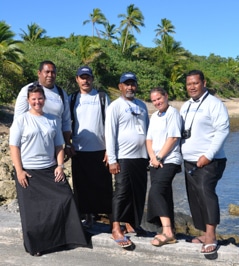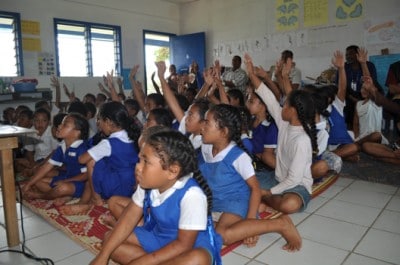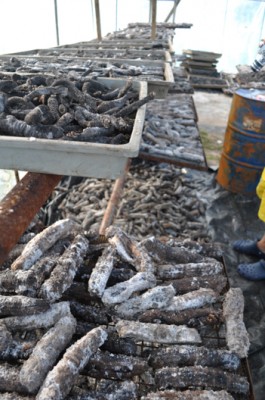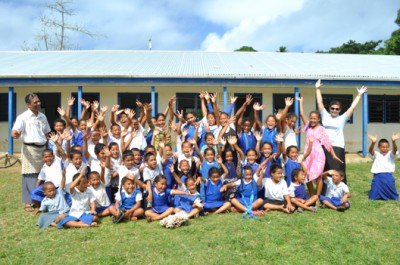Passion Drives Education and Conservation
By Amy Heemsoth
Living Oceans Marine Education Team Promotes Coral Conservation

From September 10th to October 3rd 2013, we were working in Tonga. In addition to underwater research, marine education about coral conservation was a large part of our mission there and we teamed up with many Tongans to help us deliver the information.
These Tongans were full of enthusiasm and energy for the coral conservation mission, a passion that was mirrored by just about everyone we met in Tonga. Each day started with a strategy meeting to determine how many students and leaders we could reach during the day through our marine education program.
The first list that we came up with had over 15 schools, and this was only for the first day on the first island that we visited. After coming up with a list, the education team hopped in a hired vehicle and set out to talk to the principals of each school. After a lot of discussion and rearranging schedules, we ended up conducting five separate coral conservation seminars on the first day. It was exhausting. When we returned from to the ship, our work didn’t end. We figured out how we could be more efficient the next day, and by the morning the Tongans had translated everything into Tongan and we were ready to go again, more streamlined.

We continued like this giving marine education seminars throughout the Ha’apai Island Group, and the Vava’u Island Group. In each place, we were encouraged to talk to as many people as possible and everywhere we went students were highly motivated to learn all they could about coral and ocean conservation. Nowhere was this more prevalent than on the small community on Ovaka Island. Here people had already taken matters into their own hands.
Tongan Community Combats Overfishing
This community had decided to stop harvesting sea cucumbers for commercial purposes. Additionally, they had already decided to cease the harvest of sea turtles and their eggs, which is part of the Tongan’s diet. They came to the conclusion that both animals were suffering from overfishing and that they needed to rebuild the stocks. They recognized this, not through scientific research or marine education programs, but because they saw the decline with their own eyes and decided to do something about it.

When asked why they do it a representative explained, “We are doing it to preserve our resources to create better lives for the people in our community, while protecting what’s in the ocean.”
Never has ‘preaching to the choir’ been more fulfilling. Our Education Team was able to give facts and figures and provide context to the overfishing local people had been observing, and in return we learned about how a local community organized coral conservation actions that could really work.
This community was also the first one to establish a Specially Managed Area (SMA) in Tonga, and we heard others in the Vava’u Island Group say several times that they want to model a SMA after Ovaka.
Education is highly valued in Tonga. And the Tongans we worked with were adamant about educating not only students, but also their communities. They truly cared about the future of the coral reefs so that they will continue to provide resources and income for Tongans for generations to come.

The Tongan representatives we worked with included:
‘Apai Moala, Senior Geological Assistant
Hoifua ‘Aholahi, Assistant Conservation Officer, Ministry of Lands, Environment, Climate Change & Natural Resources (MLECCNR).
Malakai Finau, Conservation Officer, Ministry of Lands, Environment, Climate Change & Natural Resources (MLECCNR).
Sione Tui’moala Mailau, Assistant Research Officer, Ministry of Agriculture, Forests and Fisheries (MAFF) Karen Stone, Vava’u Environmental Protection Association (VEPA).